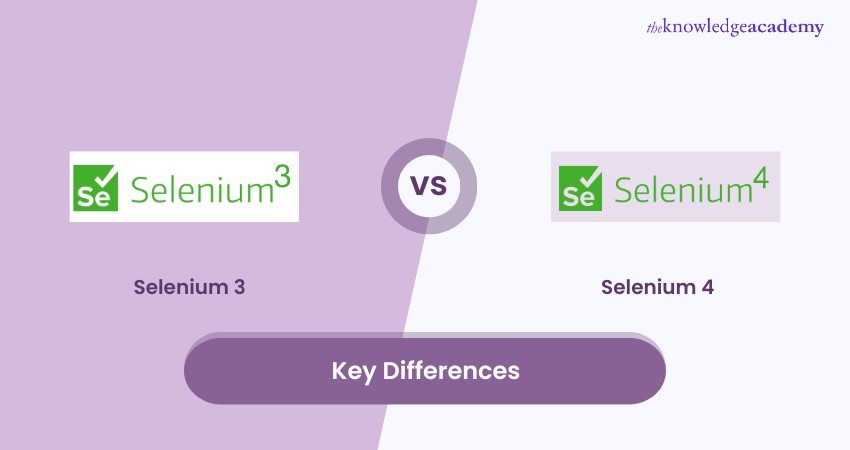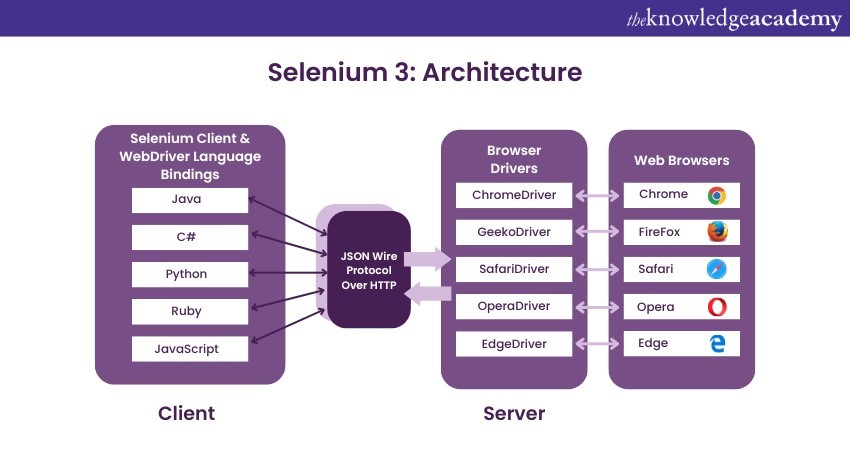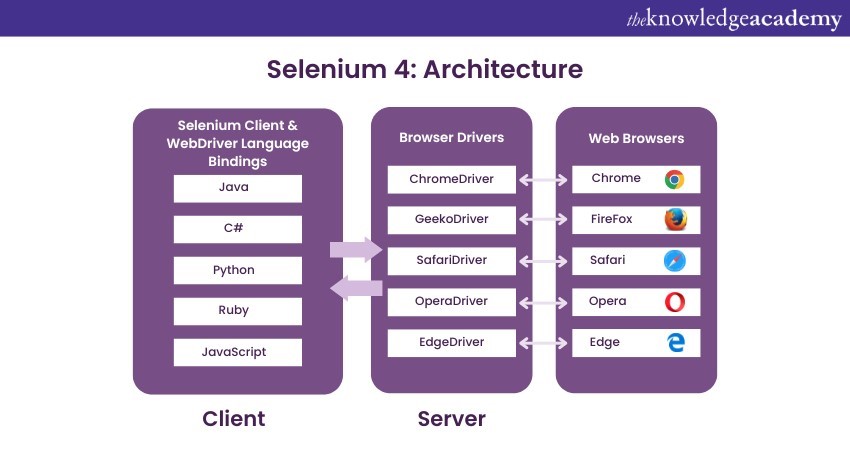We may not have the course you’re looking for. If you enquire or give us a call on 44 1344 203 999 and speak to our training experts, we may still be able to help with your training requirements.
Training Outcomes Within Your Budget!
We ensure quality, budget-alignment, and timely delivery by our expert instructors.

Selenium 3 vs Selenium 4Transitioning from Selenium 3 to Selenium 4 represents a leap forward in web automation. In this blog, you will learn the critical differences between Selenium 3 vs Selenium 4, from its advanced WebDriver to improved debugging tools. We’ll dissect the key differences between the versions, emphasising why the upgrade is not just necessary but beneficial.
Join us as we explore the intricacies of Selenium 3 vs Selenium 4, equipping you with the knowledge to harness the full potential of these powerful automation frameworks.
Table of Contents
1) Selenium 3: Architecture
2) Selenium 4: Architecture
3) What are the differences between Selenium 3 and Selenium 4
a) Extension of Chrome Driver
b) Client and Server Communication System
c) Starting the Hub & Node Jars
4) Conclusion
Selenium 3: Architecture

The architecture of Selenium 3 is based on Selenium WebDriver, Selenium Grid for parallel testing, and Browser Drivers for browser communication. It enables testers to automate Web Application Testing across different browsers and platforms.
Selenium 3 follows a client-server architecture consisting of four major components. Let’s explore them below:
1) Selenium Client Library
2) Language Bindings
3) JSON Wire Protocol using HTTP
4) Browser Drivers
The architecture of Selenium 3 is based on the JSON Wire Protocol. JSON stands for JavaScript Object Notation. JSON Wire Protocol reduces communication complexity between Client and Server by using HTTP (Hypertext Transfer Protocol).
The JSON Wire Protocol is employed for data transmission between the client and server via HTTP Hypertext Transfer Protocol. In plain words, when a request originates from a Selenium client, it travels through HTTP and is received by the JSON Wire Protocol. The Browser Driver guarantees the safety of this request. The next step is response generation by the server once the request is processed. After this, the response is sent back to the client for processing.
Selenium 4: Architecture
Selenium 4 provides architectural changes and improvements when compared to Selenium 3. The innovative element is the incorporating the Selenium DevTools API as the W3C standard. Due to this, the architecture is handled in a more closely integrated and thoughtful manner. In Selenium 4, the Selenium WebDriver architecture consists of the following four major components

1) Selenium Client Libraries
2) Binding Languages
3) WebDriver W3C Protocol
4) Browser Drivers
All the elements in Selenium WebDriver 4 are comparable with those in Selenium 3 except the JSON Wire Protocol, which is replaced by the new W3C WebDriver protocol. Now, let’s understand this in detail.
In Selenium 4, communication between the client and server is facilitated through the W3C WebDriver protocol. This protocol is adhered to by the latest versions of major browsers, such as Internet Explorer, Firefox, and Chrome, ensuring they are W3C-compliant.
The client-side comprises two principal components: the Selenium Client and the WebDriver Language Bindings. On the server side, the Browser Drivers represent the server’s functionality, interpreting the Selenium commands into actions within the browser.
The Selenium Client makes a request to run a command. WebDriver Language Bindings are mainly used for operations. After running an automated test script on the web browser, a Browser Driver will receive and respond to the command from the client.
Improve your understanding of automation and the Selenium WebDriver. Sign up for our Introduction to Test Automation with Selenium Web Driver Course now!
What is the differences between Selenium 3 and Selenium 4
Although Selenium 4 is the successor of Selenium 3, there are a few differences between them, that should be noted. If you have a grasp on the architectures of both, then the differences will be easier to understand. Here are the key differences between Selenium 3 and Selenium 4:
Extension of Chrome Driver
The first major difference between Selenium 3 and Selenium 4 is regarding the extension of Chrome Driver. In Selenium 3, the Chrome Driver is extended to the Remote WebDriver. But in Selenium 4, the Chrome Driver itself is extended.
Learn about Selenium and the ways to set up Selenium grids to perform efficient tests. Sign up for our Selenium Testing Framework Training now!
Client and Server Communication System
The second key difference is based on the mode of communication used by both. As mentioned in the Architecture, Selenium 3 uses of the JSON Wire Protocol for information transfer between client and server. However, Selenium 4 does not depend on the JSON Wire Protocol. It uses the W3C consortium to facilitate communication between the client and server.
Starting the Hub & Node Jars
The start of the Hub and Node Jars is the third major difference between Selenium 3 and Selenium 4. In Selenium 3, the Hub and Node Jars must be started in order to perform automation. In Selenium 4, the Hub and Jar nodes do not need to be started for the automation testing process.
Learn the basics of Selenium and C#, alongside its components and features. Sign up for our Selenium Immersion with C# course now!
Conclusion
Both Selenium 3 and Selenium 4 are beneficial additions to the quality testing processes of web applications. By understanding the Selenium prerequisites, you can ensure you are optimally utilising Selenium for Web Application Testing. We hope the contents of this blog have helped you understand the key points and differences in the Selenium 3 vs Selenium 4 debate.
Improve your skillset and expand your knowledge on Selenium and Python. Sign up for our Selenium WebDriver with Python Training course now!
Frequently Asked Questions

Selenium 4 introduces a significant change in unifying WebDriver API adherence to W3C standards and, as a consequential step, promotes compatibility between different software implementations. The requests and responses, which communicate across the protocol, are no longer encoded and decoded by the API.

Selenium 4 is considered better than the Selenium 3, as it introduces more advanced features including improved APIs, native support for Chrome DevTools Protocol. It also has an enhanced Selenium Grid for easier setup and management, and additional capabilities for capturing screenshots and video.

The Knowledge Academy takes global learning to new heights, offering over 30,000 online courses across 490+ locations in 220 countries. This expansive reach ensures accessibility and convenience for learners worldwide.
Alongside our diverse Online Course Catalogue, encompassing 17 major categories, we go the extra mile by providing a plethora of free educational Online Resources like News updates, Blogs, videos, webinars, and interview questions. Tailoring learning experiences further, professionals can maximise value with customisable Course Bundles of TKA.

The Knowledge Academy’s Knowledge Pass, a prepaid voucher, adds another layer of flexibility, allowing course bookings over a 12-month period. Join us on a journey where education knows no bounds.

The Knowledge Academy offers various Selenium Training, including Selenium Immersion with C#, Selenium Testing Framework and Selenium WebDriver with Python Training. These courses cater to different skill levels, providing comprehensive insights into Selenium Send Keys.
Our Programming and DevOps Blogs cover a range of topics related to Selenium, offering valuable resources, best practices, and industry insights. Whether you are a beginner or looking to advance your Selenium Testing skills, The Knowledge Academy's diverse courses and informative blogs have you covered.
Upcoming Programming & DevOps Resources Batches & Dates
Date
 Selenium WebDriver with Python Training
Selenium WebDriver with Python Training
Fri 24th Jan 2025
Fri 21st Mar 2025
Fri 2nd May 2025
Fri 27th Jun 2025
Fri 29th Aug 2025
Fri 3rd Oct 2025
Fri 5th Dec 2025







 Top Rated Course
Top Rated Course



 If you wish to make any changes to your course, please
If you wish to make any changes to your course, please


